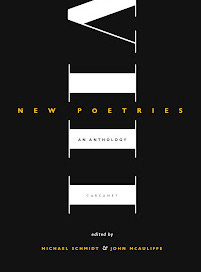New Poetries VIII: Mina Gorji on Maryam Hessavi
In the weeks leading up to publication of New Poetries VIII in January 2021 we're introducing a contributor each week, here on the blog and across our YouTube channel, the Carcanet Facebook, Twitter, and Instagram accounts, and also on the dedicated New Poetries Facebook page - follow us there to keep up to date!
Today, we're delighted to have an introduction to Maryam Hessavi's poetry written by Carcanet poet Mina Gorji, whose collection, Art of Escape was a Telegraph book of the month in January 2020.
*
Maryam Hessavi’s poem “All Blue Things” opens with an arresting claim: “I was once a chicken heart; / small, singing down the river”. The strangeness of this image suggests another idiom, perhaps that it has been translated from a darker fairy-tale world. If the singing heart is a familiar trope in lyric poetry, it is usually a human heart that sings, not the heart of a chicken. Hessavi’s poems offer us the body translated and made strange - close up and in parts, hearts, livers, thighs, tongues all appear in their own right, strangely separated and transformed, given few forms and agency.
In “All Blue Things” the word “small” signals a preoccupation with scale that threads through the poem: when a mastodon appears, unexpectedly, the elephantine mammal is soon shrunk to a child’s crayon scrawl, reduced and made familiar:
I was once the mastodon
in children’s crayon scrawls
Once the liver leaking bubble
on the knife and board,
or the feather fallen
onto Morecambe Bay
If the shift from mastodon and children’s crayon seems like a shift between worlds, the juxtaposition of the visceral and grotesque “liver leaking” with the delicacy of “bubble” is more unsettling, a sense of discomfort sharpened by the image of a “knife and board” that follows. The delicacy of bubble is set against and heightened by the hardness of knife, just as the smallness of the feather, the poem’s concluding image, is emphasised by huge expanse of Morecambe Bay into which it has fallen.
The play with and between scales is striking in a number of her poems. A dynamic of the small against the vast is a recurring trope; we find it, for instance, in “Mango Bruise (a sonnet)”. In this diminished ‘sonnet’, we move from the intimacy suggested by “my right thigh” out to the vast and distant “Neptune” and back again to the small, the bodily, “bruise”, before “blood vessels” open up to the cosmic scale once again, in “constellations” to shrink down into “the pores”, “blood” to “stars” and “finger” out into “space”, where the poem ends. These shifts between intimate and cosmic bodies provide a kind of visual rhythm:
Mango Bruise
(a sonnet)
Inside my right thigh
there is a Neptune bruise
turning to
red moon and
Sparse constellations
in the pores,
drying blood
clotting stars
And a sweet hurt
every time
I send a finger
into space
Here the p and s and c sounds of the phrase “sparse constellations” carry like the colours of a bruise spreading through “pores”, “clotting stars”, “sweet” and finally the a sounded in “constellations” opens into “space”. This fusion of sound and image recalls Mina Loy’s notion of poetry as “a music made of visual thoughts, the sound of an idea”, which Hessavi cites as an influence; in this poem it is experienced as sounds spreading through images, images spreading through sounds.
The play between intimate and distant, near and far, speaks to another of Hessavi’s preoccupations: the pull between linguistic familiarity and estrangement. A number of poems explore the experience of knowing and - not quite knowing - a second language, Farsi. It is, she explains, “a second tongue”, in a phrase that is both evocative and strangely unsettling. Not quite a “mother tongue” or a ‘second language’, here “mother” is displaced by “second”, a transformation which suggests a strange physiological distortion. Again, the body and its parts are made strange and uncomfortable.
Speaking of her own relationship with this “second tongue”, Hessavi explains in the preface to her poems that Farsi words often appear unmoored from meaning, experienced from the outside, viscerally; this is the body of language experienced as a kind of strange physicality without the lightness of understanding. And yet for Hessavi, the strangeness is often mingled with a kind of affectionate familiarity. This mixture of intimacy and unsettling corporeality is a feature of her poem “Jigarreh-Man (which you said you’d eat)”, for instance. Jigarr, as she explains in the footnotes to the poem means ‘liver’ in Farsi, so the literal English translation offered in parentheses “(which you said you’d eat)” and repeated in the poem’s final lines, sounds grotesque. But, as Hessavi explains in, in the Persian idiom, Jigarr is also a term of love and endearment, eating your liver is playful and figurative, an expression of love. In this poem, the liver, which represents affection for Farsi speakers, is also, Hessavi knows, for many of its readers, an organ displaced from the body of its idiom. Hessavi plays knowingly with the estranging effect, as she does in a number of the poems, moving between familiar and strange, rose and liver, petals and stars, intimate and distant.
*
Read Maryam Hessavi's own introductory commentary on her poems, taken from the anthology, and watch her reading a poem here.





